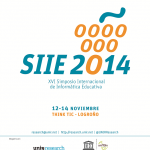ENGL – SIEE 2014 – Call for Papers

XVI International Symposium on Computers in
Education, SIIE 2014
Universal and massive access for life-long learning
Logroño, La Rioja, Spain
November 12-14, 2014
Organization
· Spanish Scientific Society on Computers in Education (ADIE)
· International University of La Rioja
Sponsorships and Collaborations
· IEEE Education Society
· Spanish Chapter of IEEE Education Society
· Spanish Chapter of ACM SIGCSE
· Association of Computer Science and Engineering Technicians (ATI)
· UNESCO Chair in eLearning, UNIR
· Spanish Association for eLearning (TELspain)
Aims
The International Symposium on Computers in Education (SIIE) is an international forum for the presentation and debate of the latest research advances on the use of Information and Communication Technologies (ICTs) in Education. The Symposium aims at becoming a major point of contact between researchers, developers, institutional representatives and educators willing to share their points of view, knowledge and experiences.
This is the sixteenth edition of SIIE and it has as main topic the massive and universal access to learning resources for supporting life-long learning. Thus the symposium aligns with the latest developments on approaches that, like MOOCs (Massive Open Online Courses), suppose a real and worldwide tendency towards a universal access to high-quality open learning materials. As a consequence, this new SIIE edition aims to promote significant advances in the way in which the methods, techniques and tools of Computers in Education can contribute to the enhancement of an inclusive, personalized and life-long access to a universal cultural heritage.
In addition to the classic “Computers in education” and “Computing education” tracks, this new edition of SIIE incorporates two additional tracks associated with the International Workshop on Software Engineering for eLearning (ISELEAR) and the Multidisciplinary Symposium on Design and Evaluation of Digital Learning Contents (SPDECE).
Scope
SIIE 2014 is structured in four different tracks:
· Computers in education. This track includes a wide variety of topics related to the application of ICTs to education.
More specifically, topics of interest include but are not limited to:
o Learning analytics
o Application of pedagogical theories to educational software design
o Web semantic applied to education
o Educational software for specific domains
o Distance, on-line and blended learning
o Collaborative learning
o Mobile/ubiquitous computing in education
o Authoring of educational materials
o Massive Open Online Courses (MOOCs)
o Open knowledge in education
o Design and standardization of educational technologies, modelling languages and metadata
o Design, development and evaluation of innovative educational software
o E-Assessment: theories, methods, tools and experiences
o Personal learning environments
o Teacher training in ICT
o Knowledge, technology and competences management in education
o Artificial intelligence in education
o Human-computer interaction in education
o Virtual and remote laboratories
o Methodologies of use and innovative experiences with educational software
o Educational data mining
o Multimedia, hypermedia and visualization in education
o Virtual worlds in education
o Educational robotics
o Web-based courseware, tools and resources
o Learning management systems: architectures and platforms
o Non-formal and informal learning in workplace
o Games and simulations in Education
o Social web and communities of practice
· Methods and cases in computing education. This track includes those topics related to Computing Education, including methods and tools for education in specific Computer Science subjects, as well as learning and teaching strategies promoting a general computational thought beyond particular disciplines.
Topics of interest include but are not limited to:
o Design and evaluation of teaching-learning tools for computing education
o Visualizations and animations for computing education
o Simulations and serious games for computing education
o Curricular design for computing disciplines. Methods and implementation cases concerning ACM/IEEE CSC 2013
o Computing in secondary education. Computational through
o Teaching and Learning of Core Computing Topics (Programming, Databases, Operating Systems, Computer Architecture, Programming Languages and
Compiler Construction …)
o Computing in science and the humanities. Methods and educational cases in computational science
o Methods and cases in platform-based development (web, mobile, etc.)
o Learning strategies in computing
o Massive open online courses in computing
· Software engineering for eLearning. This track is associated to the 5th International Workshop on Software Engineering for eLearning (ISELEAR’14). Thus, this track addresses the technical aspects of the systematic development of eLearning applications using software engineering methods adapted and/or specific for the educational application domain.
Topics of interest include but are not limited to:
o Software requirement engineering in eLearning.
o Software architectures, modelling, specification, design and implementation of eLearning systems
o Software technologies applied to the development of complex eLearning systems
o Management of interdisciplinary teams including instructors, domain experts and developers for the production and maintenance of eLearning systems,
applications and contents.
o Testing, verification and validation of eLearning software
o Quality assurance of eLearning software
o Empirical methods in software engineering for eLearning
o Model-driven software engineering for eLearning
o Software language engineering and eLearning
o Applying software engineering tools to emerging eLearning trends (PLEs, MOOCs, etc.)
o Standardization and normalization.
o Systematic reviews on software engineering for eLearning
o Practical experiences and lessons learned
· Design and evaluation of digital educational contents. This track is associated to the XI Multidisciplinary Symposium on Design and Evaluation of Digital Educational Contents (SPEDECE’14). The track is focused on the research on new electronic media for education and training based on digital content design. Topics are oriented to the enhancement of the flexibility and reusability of digital contents for enabling their use in different context, the organization of digital contents in repositories, the use of these contents in new environments and pedagogical methods (especially the competencybased
ones), and the role of digital contents in the assessment of learning outcomes.
Topics of interest include but are not limited to:
o Design, evaluation and use of reusable educational resources.
o Repositories, collections and aggregators of digital educational resources
o Theory and practice of the instructional and technical design of learning resources and activities.
o Interoperability and standards for the production of learning resources and learning designs.
o Educational design patterns for enabling reusability
o Data mining and learning analytics in educational repositories
o Data mining and learning analytics in online learning social networks
o Multidisciplinary and interdisciplinary concerns and studies in eLearning
o Design of courseware, and massive open online content and courses
o Application of the design and evaluation of educational contents to secondary and tertiary education
o Integration of repositories and learning management systems
o Experiences and evaluation of collaborative learning in open scenarios (wikis, software factories, communities of practice)
o Description and exploitation of educational contents with metadata and semantics
Contributions
The symposium welcomes high quality contributions describing original work of computers in education. Contributions can be of any of the following two categories: full papers and short papers. Contributions can be written in Spanish, Portuguese or English.
All contributions must be sent as PDF files and follow the official IEEE Proceedings format guidelines. Contributions will be limited to the following number of pages: full papers (6 pages), short papers (4 pages).
Submissions must be made using the EasyChair conference site.
Important: When submitting a contribution you must select one of the four tracks included in the symposium. For this purpose, you must select the adequate option for the “Category” field:
· Computers in Education
· Methods and Cases in Computing Education
· Software Engineering for eLearning
· Design and Evaluation of Digital Contents
Accepted papers will be published in the symposium proceedings (publication with ISBN) and distributed to participants during the symposium. English versions of the papers presented will be published as post-proceedings by IEEE in IEEE XPlore.
Moreover, several selections of the best papers will be made and published as extended papers in different journals and monographs. At the moment, we have confirmed special issues in the following venues:
• International Journal of Engineering Education (IJEE) (JCR-SCI indexed journal)
• Novática / Upgrade
• VAEP-RITA / IEEE RITA
• IE Comunicaciones
• Teoría de la Educación. Educación y Cultura en la Sociedad de la Información
• TICs Aplicadas para el aprendizaje de la Ingeniería (TICAI)
In addition publication of extended and revised versions of the best papers in other special issues is being currently negotiated with other journals (including JCR-indexed ones). The complete information will be updated in the SIIE’14 website.
Finally, the best research paper presented will receive the 3rd “Antonio Vaquero” prize to the SIIE’14 best paper.
Workshops
In addition to the presentation of scientific papers, SIIE’14 will include several 2 or 2+2 hour workshops and thematic sessions. These sessions will be organized in rooms equipped with a laptop and a projection system, with capacity for a maximum of 30 participants.
Formats of the workshops and sessions include but are not limited to:
· Hands-on workshops addressing educational technologies. These workshops are conceived as participative events in which attendees will experience with different technological advances. Organizers are expected to introduce the technology and to let participants work with this technology.
· Thematic sessions. These sessions will be focused on a particular subject and will include a talk or set of talks oriented to motivate discussion. Organizers are expected to give the motivational talks, and also to invite attendees to an active participation.
Workshop proposals will be submitted using a format and procedure identical to the pointed for contributions. In this way, the submission will be made using the EasyChair website.
Important: Workshop proposals must be submitted selecting “Workshops” as the “Category” value.
Proposals will be limited to 1 page, and they must be formatted using the IEEE template. These proposals must include the following sections:
· Abstract
· Workshop Description
· Detailed Program (indicating the workshop duration: 2 hours or 2+2 hours)
· Added value for participants
These proposals will be peer-reviewed following the same procedure than for scientific contributions. Accepted proposals will be included in the Symposium Proceedings. In addition, after the symposium organizers will be invited to prepare a paper summarizing the workshop outcomes, which will be included in the IEEE Xplore post-proceedings.
Important Dates
• Deadline for paper and workshop proposal submissions: June 30, 2014 (extended deadline)
• Acceptance communication: July 11, 2014
• Deadline for camera-ready versions of accepted papers and workshop proposals: July 25, 2014
• Deadline for author registration: September 10, 2014
• Symposium celebration dates: November 12-14, 2014

